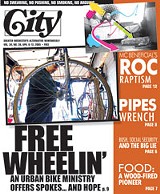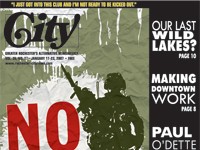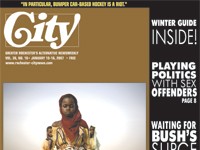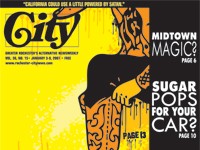[
{
"name": "500x250 Ad",
"insertPoint": "5",
"component": "15667920",
"parentWrapperClass": "",
"requiredCountToDisplay": "1"
}
]
It's a few minutes before 8 a.m., and Tony Burgio and Dean Contreras are eating nearly identical breakfasts. Burgio has already polished off a bowl of grits before a server brings plates crowded with an omelet, home fries, and a buttered bagel. Another plate of doughnuts eyes them from the middle of the table.
They devour their food and wash it down with milk, orange juice, and coffee. A serverclears their dishes, they joke around, and Burgio glances at the newspaper, but nobody brings a check. Like the other 37 people signed up for breakfast at Asbury First United Methodist Church, they ate for free.
For more than a year, Burgio and Contreras have met for breakfast every Wednesday. They have fallen into the safety net churches and other social organizations have expanded over the last decade. Places like Asbury's Dining and Caring Center now offer more than an occasional hot meal for the homeless, and recognize that many people they serve are trying to make it on their own.
Asbury has tried to give its center, housed in the basement of what was once an East Avenue mansion, an atmosphere of dignity. Volunteers consider the people there guests, and wait on them like it's a restaurant.
Contreras and Burgio can rattle off several other places they can get a free meal --- St. Joe's, Dimitri House, the Urban Center, Blessed Sacrament, Salem's "Million Dollar Dinner." And if you're willing to put up with sermons and people who haven't bathed for a while, they say, there are some last resorts.
"If you starve in Rochester, you're an idiot," says Contreras, whose routine schedule of eating out often covers three meals a day.
Burgio has bounced around to many community outreach centers to meet his needs too, but usually cooks at his apartment now. On Wednesdays, though, he and Contreras come to Asbury for more than just their meals.
"Ahh, the bikemasters are here," a man says to Burgio after breakfast one morning.
Burgio and Contreras fix bikes donated to Asbury and distribute them every Wednesday morning for free. The pair has transformed the informal service, started by one Asbury volunteer, into a high-powered charity enterprise.
The used bikes are donated from scrap yards, bike shops, and anyone else willing to pass on a ride, and the crew works without pay. While Burgio loves helping people in need, he also recognizes the sense of purpose being part of the bike crew provides.
They work in a garage behind the church on all but the worst winter Wednesdays. Apparently, this morning in early March isn't bad enough to keep them inside. The temperature is in the teensand snow trickles from the gray sky. They tell Rand, the 70-year-old volunteer manager of the Caring Center, they will only work a half-hour. Rand, who asks to go by his first name only, is the man who started the bike ministry in the '90s and still oversees the operation Burgio took over nearly two years ago.
When it snowed the week before, Rand asked the crew to stay inside so nobody got sick. They moved storage cabinets filled with toothpaste, soap, and other hygiene products into a supply room and Contreras even finished off a set of stairs designed to help move bikes off and on a storage truck. "The stairway to heaven," he calls it. After missing last week, the bike crew wanted to meet the requests of the people asking for bikes and repairs.
Burgio puts on a series of shirts --- the third and last one a sweatshirt with "Results" printed on it --- and then adds a thermal coat. Finally, he dons a black hat with earflaps and grabs the tools he carries in a Winnie the Pooh lunch box. Burgio and Contreras lead a handful of men --- two more crew members and a few waiting for bikes --- to a garage just big enough to fit a pickup truck. Inside, they've crammed more than 20bikes. Some are on hooks, some lean against a wall, and some lay in pieces. Tires hang from the ceiling, and a narrow column of shelves houses spare pedals, brakes, seats, and cables.
A sign usually placed outside when more people are waiting reads, "No swearing, No pushing, No smoking, No arguing." Burgio smokes a cigarette and soon breaks the first rule, too. He and the crew start wheeling bikes out of the garage to make workspace, planting them in a snowbank.
Contreras opens his toolbox, and it reveals a cartoon he's taped inside. It shows a woman walking in on her husband in bed with a bike. "I knew it," she exclaims. Before any bike work, Contreras sticks a tape in the stereo and tells Donald, one of the men helping today, to listen. Contreras raves about this speaker who came to the Alcoholics Anonymous convention he worked over the weekend.
"If you want to know what it was like for me growing up in California, just watch Jerry Springer," the speaker says as the bike crew laughs. "I consider myself one of Jerry's kids."
Nearly everybody who works on the bike crew is in recovery for substance or alcohol abuse, and Contreras and Burgio say they try to show their workmates how good life can be without addiction. Their chosen method is sarcasm.
"Donald, I need you to go make a run," Burgio says about going to find a tool inside.
"Not that kind of run," Contreras reminds him. "Not a beer run."
But they can get serious, as they did the week before when Donald failed to show up before lunchtime. When Contreras finally saw him, he ran up to him and sniffed his breath. "Whoa," Burgio cried when he saw Donald and escorted him into the supply room and shut the door. Contreras turned on the vacuum, so nobody would hear this spontaneous counseling session. Later, Burgio said Donald hadbeen drinking.
Donald came early this time, and helps the crew until leaving for his outpatient meeting at Main Quest Treatment Center on West Main Street.
Within minutes of opening the garage, both Contreras and Burgio hoist bikes onto stands that lift the frames above waist level. Usually they pass out a sign-up sheet and operate first-come first-serve, but instead they keep a mental list of the few customers jittering outside the garage.
Burgio first worked on a BMX bike for the son of a friend from Narcotics Anonymous. He wears a gold "NA" earring and is the chair of the NA phone helpline. His business card reads "Twisted Tony B." on the front and has a message about the success of the 12-step program on the back. He goes to at least four NA meetings a week and regularly encourages addicts and people in recovery any way he can.
Wearing cotton gloves with their fingertips cut off, he tries to squeeze oil onto a chain, but the fluid comes out like glue. "Damn, it's too cold," he says. Nevertheless, by the time a friend arrives to pick up the bike, Burgio's managed to eke out enough oil so the pedals spin freely. He tells his friend to keep the bike inside for the rest of the winter to keep the chain from catching.
While working on the bikes, Burgio tells his story. Like many who go to Asbury, he is open about his hardships when asked. Burgio talks with a raspy voice and is missing his teeth from years of neglect. A nomadic life of crime --- using and selling drugs from New York City to Los Angeles --- led to a stint in prison and finally three years of homelessness.
Burgio started coming to Asbury in 2001, still addicted to crack and heroin and living mostly in the old downtown subway tunnels. "Tony went through more sleeping bags than anyone," says Bill Lisi, who helped start Asbury's Dining Center in 1993 and now assists people looking for housing.
At first Burgio wanted to help with the bike ministry in order to get a good ride for himself and scam other primo parts. He would fiddle around on a couple bikes each Wednesday, gashing his hands with the tools, but says Rand never knew he was still hooked. In March of 2003, he decided he was getting too old to survive Rochester winters so he checked in to Main Quest.
"When I finally got clean Rand said, 'Man, you're flying through those things,'" the 43-year-old Burgio says.
Shortly thereafter, Rand decided to hand the reins of the bike ministry to Burgio. By December of 2003, Burgio found an apartment on Mt. Hope Avenue using the money he started receiving from the Department of Social Services (DSS). This is rare, Lisi says, since few landlords will risk taking rent from DSS money.
In the spring of last year, not long after Burgio found himself a place to live, the bike crew found a new home out in the garage. The demand for bikes combined with the increased number of people eating at Asbury led to the move from the basement Dining Center.
Volunteering at Asbury has allowed Burgio to go from what Rand refers to as someone with "four walls and a floor" to someone who enjoys the luxuries of American life. His apartment has an answering machine, a CD player alarm clock, and a laptop computer, all of which were donated to the church. His living room also includes a bike stand, where he fixes bikes for his neighbors.
On March 24, Burgio celebrated two years of sobriety. After years of taking from society, he says, working on bikes gives him the sense of giving back. On a busy summer day, the bike crew fixes up more than 20 bikes, and Burgio says they have given out more than 1,000 bikes over the last two years. For many, a refurbished bike is their only transportation. Lisi has encouraged Burgio, who's unemployed, to use his people skills to go back to school and become a substance-abusecounselor, but for now Burgio is content using his street-smarts for the bike ministry.
Years of scamming help Burgio sniff out people who come for a bike, sell it to buy drugs, and then return for another within a month. To prevent this, the crew started taking pictures of people with their bikes and recording serial numbers to match with their name. If someone says a bike was stolen, the crew asks for a police report before replacing it.
Still, some are less subtle than others. One man approached Burgio the week before and told him he got drunk and couldn't remember where he left his bike. Burgio sensed a scam and said they weren't doing any bikes that day. "Give me a bike or I'll pull a knife," the man threatened. "Go ahead and pull it," Burgio said, calling his bluff before the man backed off.
Burgio's responsibilities have grown into more of a supervisory role since Contreras started coming to Asbury in the fall of 2003. "Tony's a great delegator," Contreras says while replacing the gears, derailleur cables, and brakes on a bike. He wonders aloud why he always ends up with bikes that need complete overhauls, and Tony laughs off the razzing.
Contreras, also 43 years old, never envisioned himself in this position. "I came in for a bike," he says, "and never left." Contreras was a functional addict, he says, holding jobs ranging from construction to trucking despite a cocaine habit that cost as much as $300 a day.
At Asbury, he's become a jack-of-all-trades. Two weeks earlier, he built a Dutch door to the supply room so a volunteer can stand behind the closed lower half and set the hygiene products on its countertop for guests. The six-foot-four-inch Contreras, whose large frame and thick beard gives him the look of a rugged lumberjack, regularly uses words like "please" and "thank you." Gail McClain, the first full-time paid director of the center, affectionately calls him the court jester.
It's fortunate Contreras maintains his sense of humor. His bout with alcohol and substance abuse has broken his families --- he has a 22-year-old son with his ex-wife and two younger boys with his ex-girlfriend --- and left him unemployed for almost a year-and-a-half, what he calls the longest period of his life.
In the fall, Contreras started shopping a résumé with the help of East House, the program that finances the supportive living apartment he shares with a roommate. Through DSS aid, East House gives Contreras a personal-needs allowance of $240 a month. To receive this money he must work 16 hours a week as part of the Work Exchange Program. The WEP is intended to give people experience to put on their résumé, but Contreras laughs at the idea of including his broom-pushing position along with his other credentials.
Contreras, who grew up on Joseph Avenue, says he hopes to hear about a long-haul trucking job with a business called Dependon in Chicago any day. If that falls through, though, he may drive South in the 1995 Toyota Corsica he bought off a crack head for $170. He says they pay better down South and like the work ethic of Northerners. When Mark Hill, who volunteers with the bike crew, agrees that it's hard to get work in New York, Contreras says that's not entirely true. "You can find a job," he says. "If you can live on $5.15 an hour."
Contreras has been occupying himself with AA meetings, where he says people are more serious about recovering than at NA, and loves meeting people at the places he eats. Contreras also works on bikes more than just Wednesdays; Burgio sometimes opens the garage after a weekend and finds several new bikes ready to roll.
This morning they've finished off a few bikes, and it's approaching 10 a.m., an hour later than Burgio originally wanted to stay outside. Most of the men, including Burgio, have complained about their fingers going numb, but they keep working. A man standing quietly inside the edge of the garage has been waiting more than an hour for the crew to repair his bike. He had cushioned the seat by filling plastic bags with towels and wrapping tape around them.
The tape of the AA speaker has ended, giving way to a classic rock station, and in between a sing along to REO Speedwagon's "Roll With the Changes," Burgio says he understands how much this man relies on his bike. "This is such a blessing," the man says repeatedly.
Meanwhile a man the crew calls "Dreads" has just come back outside from the dining center to check if they have a bike ready for him. The crew already told him they weren't passing around a formal sign-up sheet for bikes today, but he asks for the list again in hopes of moving them along. Then Dreads tells the man who waited patiently how he had been homeless for seven months, has a bare apartment now, and needs a bike to get around.
The crew finishes a bike for Dreads last. With a disposable camera, Contreras snaps a photo of Dreads smiling with his bike. He rides off and they lock up the garage a little after 11 a.m.
The crew heads inside and soon eats soup, tuna sandwiches, and chocolate-chip cookies. Eighteen people have signed up for lunch, most using first names and possibly aliases. Asbury will serve anybody, but uses a sign-up sheet to gauge how much food they need to order.
Rand is pretty certain anyone who eats there must need to, but he is unsure how many guests will ever reach self-sufficiency. Most volunteers accept that at least half are lifers, but they believe some just need temporary help.
Many of these people come to Asbury's popular Sunday meal. The last Sunday of the month is busiest, often drawing families and others who eat there occasionally. Several of the 100-plus guests they serve on these Sundays are paid at the beginning of the month, and cannot make ends meet.
On a recent Sunday, a man who owns a fruit-paring business sat alongside a friend on the verge of losing his printing business because of a drug and alcohol relapse. Near the door, two young children sat at the piano, one of them banging out the opening melody of Deep Purple's "Smoke on the Water" above the commotion.
During the bike crew's lunch on Wednesday, the piano sounds much smoother. A man works his way through a songbook of Beatles and other pop hits. When he plays the chorus of a John Denver tune, the bike crew breaks into song. "Take me home, country roads, to the place I belong," they bellow.
The following Wednesday feels like spring. The sun is out and the temperature is in the 30s. Several more men than the previous week mill outside the garage, and Contreras tries to convince a friend how popular Beach Cruiser bikes have become.
"I'll look like a grandpa," Patrick Snyder says about the bike Contreras is urging him to take.
"Now you can take girls on dates," Contreras says while pointing to the passenger seat above the back tire.
Eventually Contreras wins Snyder over, telling him they're so popular that someone stole the Beach Cruiser they gave "Old Man Bill," who cooks at the Rochester Urban Center on Amherst Street.
Contreras jokes even more than usual this Wednesday, with good reason. He found out he would be starting the trucking job within a week.
"I can't wait to be back out on the road, listening to my tunes, my books on tape," he says.
Contreras's good news is bittersweet for Burgio.
"I guess I'm going to have to go back to doing bikes," Tony half-jokes, before wondering aloud how he'll replace Contreras. "We'll manage. If they have to wait another 10 minutes for a bike then they'll have to wait."
Contreras will come back to Rochester periodically, because his job requires him to haul products from Xerox in Webster. He also plans to return once a month to help with a bike-repair mentoring program for at-risk youth at Second Life Bikes on Borchard Street.
"I'm not giving up my keys," Contreras says about the likelihood of sneaking into the garage every once in a while. "I'll just have to find a girlfriend so I have a place to crash when I come back."
Latest in Featured story
More by Geoff Graser
-

Staying alive
Aug 10, 2005 -

Five for fighting
Aug 3, 2005 -
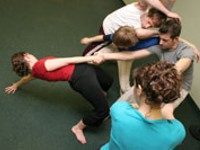
Go ahead, push me
May 11, 2005 - More »
